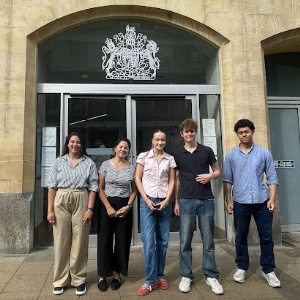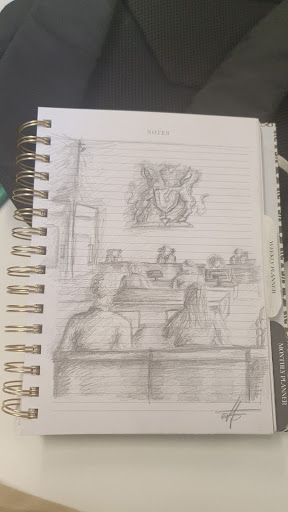
Justice in Action: Sixth Form Students Visit Cambridge Magistrates' Court
Published on 13/10/25

Veronica Escudero, Head of Spanish, tells us all about the Sixth Form students visit to Cambridge Magistrates’ Court.
It is important for prospective law students to see in practice what they will be learning at university. To this end, Sixth Form students interested in pursuing a law or justice-related field degree were offered the opportunity to see the justice system in action.
A trip to the Magistrates' Court, while potentially daunting, can be a surprisingly interesting experience. Understanding the structure, protocol, and purpose of the court can enhance the experience and give students a sense of what working in this environment encompasses.
 After going through an airport-style security check, students took their seats in the public gallery to watch Prosecutors, Defence Solicitors and Magistrates at work during a number of court cases. Photography, filming, and audio recording are typically not allowed in courtrooms or any part of the court building. Hence, courtroom sketching remains a vital and respected form of visual journalism as they convey the living “essence” of the trial proceedings, including when attending remotely. Fortunately, this year one of the students, Lydia, was able to provide us with a glimpse of the Cambridge Magistrates’ Court on the day.
After going through an airport-style security check, students took their seats in the public gallery to watch Prosecutors, Defence Solicitors and Magistrates at work during a number of court cases. Photography, filming, and audio recording are typically not allowed in courtrooms or any part of the court building. Hence, courtroom sketching remains a vital and respected form of visual journalism as they convey the living “essence” of the trial proceedings, including when attending remotely. Fortunately, this year one of the students, Lydia, was able to provide us with a glimpse of the Cambridge Magistrates’ Court on the day.
Year 13 student Conor said: “On reflection, it was very eye-opening to witness the courtroom proceedings and etiquette. For example, we had to bow to the judges when leaving and entering the room, which immediately presented a novel experience. Furthermore many of these defendants included emotional appeals within their defence, which the judges had to ignore in the “pursuit of justice”, increasing the difficulty of remaining objective when judging punishments. Nevertheless, it was encouraging to observe the judge and legal advisers treat every defendant in a humane and respectful manner, minimising the inevitable courtroom tensions as it relieved stresses on a potentially life-changing morning.”
Year 13 student Emma said: “It was interesting to see how court proceedings operated on a magistrate’s level. When first thinking of a court the traditional twelve person jury comes to mind, however through our visit we observed that this was not the case, with just three judges operating in the court. On a lower level, the court was much less about evaluating if someone was responsible for committing a crime, as most pleaded guilty in order to minimise the consequences. Instead, lots of proceedings were concerned with administering rehabilitation courses and fines.”
Year 13 student David said: “Ruminating on the trip, It was very intriguing to watch how the court cases unfolded. In particular, it was interesting to see how at the start of one case, the defendant had to take the oath, then speak to a legal advisor and things took off from there. It was fascinating to see how the judges avoided giving into emotion and holistically judged each case reaching a logical and coherent ruling. A case that stood out to me was where the defendant asked for his driving disqualification to be reduced, claiming he needed to see his children. In the end, the Judges ruled that they weren’t going to allow it as he could still work and it wasn’t in the interest of justice.”
Year 13 student Lydia said: “My time at the Magistrate’s Court in Cambridge was one of a kind, where I learned how cases proceed, who and what is involved, and how the system works. I also learned that I could do work experience at the Magistrate’s, which will be very useful to anyone intending to do a Law degree or work in the legal sector (like myself). It was a truly beautiful trip, and I didn’t even know such a magnificent experience was just on my doorstep! This is a public court, and hence open to all - I will definitely be visiting again.”